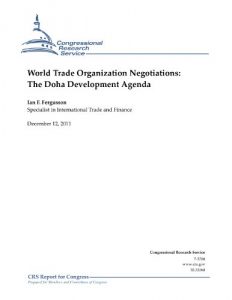The WTO Doha Round of multilateral trade negotiations, begun in November 2001, has entered its 11th year. The negotiations have been characterized by persistent differences among the United States, the European Union, and developing countries on major issues, such as agriculture, industrial tariffs and non-tariff barriers, services, and trade remedies. Partly as a result of being labeled a development round to entice developing countries to participate in the first place, developing countries (including emerging economic powerhouses such as China, Brazil, and India) have sought the reduction of agriculture tariffs and subsidies among developed countries, non-reciprocal market access for manufacturing sectors, and protection for their services industries. The United States, the European Union, and other developed countries have sought increased access to developing countries’ industrial and services sectors while attempting to retain some measure of protection for their agricultural sectors. Given the differences, there is frustration over the ability of WTO member states to reach a comprehensive agreement.
In response to the global economic crisis, the G-20 leading economies have repeatedly called for conclusion of the Doha Round as a way to bolster economic confidence and recovery. WTO Director-General Pascal Lamy referred to 2011 as a window of opportunity to conclude the round and announced an intensive work program to achieve this goal. Yet, despite a flurry of activity in early 2011, the round remains deadlocked as the eighth Ministerial of the WTO is set to occur in December.
The subjects of the current negotiations are draft texts developed and refined by the chairs of the agriculture, industrial, and rules negotiating groups. These texts have been the subject of much disagreement since their initial release in 2007, not least of which by the United States, which views them as not reflecting the state of play in the negotiations.
Agriculture has become the linchpin of the Doha Development Agenda. U.S. goals are reductions in trade-distorting domestic support; elimination of export subsidies, and improved market access in both developed and developing countries. The United States has also sought improved market access for its industrial goods, especially in developing countries. Developed countries generally are seeking improved market access for their services industries in developing countries. In addition, Members of Congress likely will carefully scrutinize any agreement that may require changes to U.S. trade remedy laws.
Several issues are among the most important to developing countries, in addition to concessions on agriculture. One issue, now resolved, pertained to compulsory licensing of medicines and patent protection. Trade facilitation, which aims to improve the efficiency of international trade by harmonizing and streamlining customs procedures, has received strong support from developed and developing countries. A third issue deals with a review of provisions giving special and differential treatment to developing countries along with problems that developing countries are having in implementing current trade obligations.
In response to the global economic crisis, the G-20 leading economies have repeatedly called for conclusion of the Doha Round as a way to bolster economic confidence and recovery. WTO Director-General Pascal Lamy referred to 2011 as a window of opportunity to conclude the round and announced an intensive work program to achieve this goal. Yet, despite a flurry of activity in early 2011, the round remains deadlocked as the eighth Ministerial of the WTO is set to occur in December.
The subjects of the current negotiations are draft texts developed and refined by the chairs of the agriculture, industrial, and rules negotiating groups. These texts have been the subject of much disagreement since their initial release in 2007, not least of which by the United States, which views them as not reflecting the state of play in the negotiations.
Agriculture has become the linchpin of the Doha Development Agenda. U.S. goals are reductions in trade-distorting domestic support; elimination of export subsidies, and improved market access in both developed and developing countries. The United States has also sought improved market access for its industrial goods, especially in developing countries. Developed countries generally are seeking improved market access for their services industries in developing countries. In addition, Members of Congress likely will carefully scrutinize any agreement that may require changes to U.S. trade remedy laws.
Several issues are among the most important to developing countries, in addition to concessions on agriculture. One issue, now resolved, pertained to compulsory licensing of medicines and patent protection. Trade facilitation, which aims to improve the efficiency of international trade by harmonizing and streamlining customs procedures, has received strong support from developed and developing countries. A third issue deals with a review of provisions giving special and differential treatment to developing countries along with problems that developing countries are having in implementing current trade obligations.












